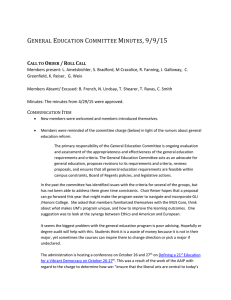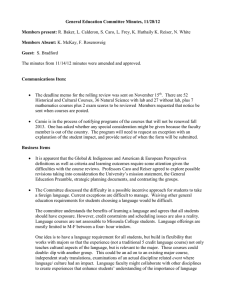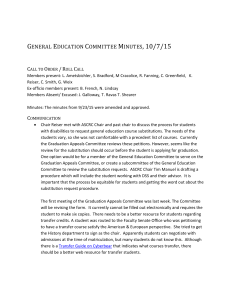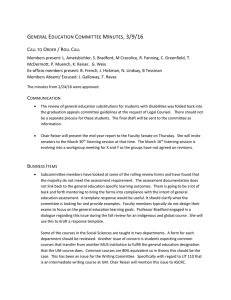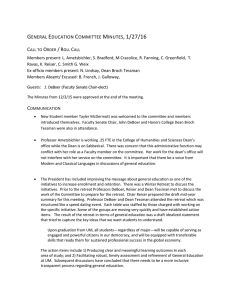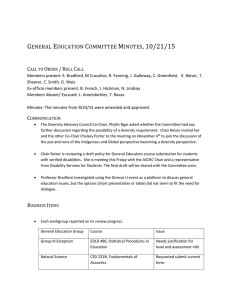G E C M
advertisement
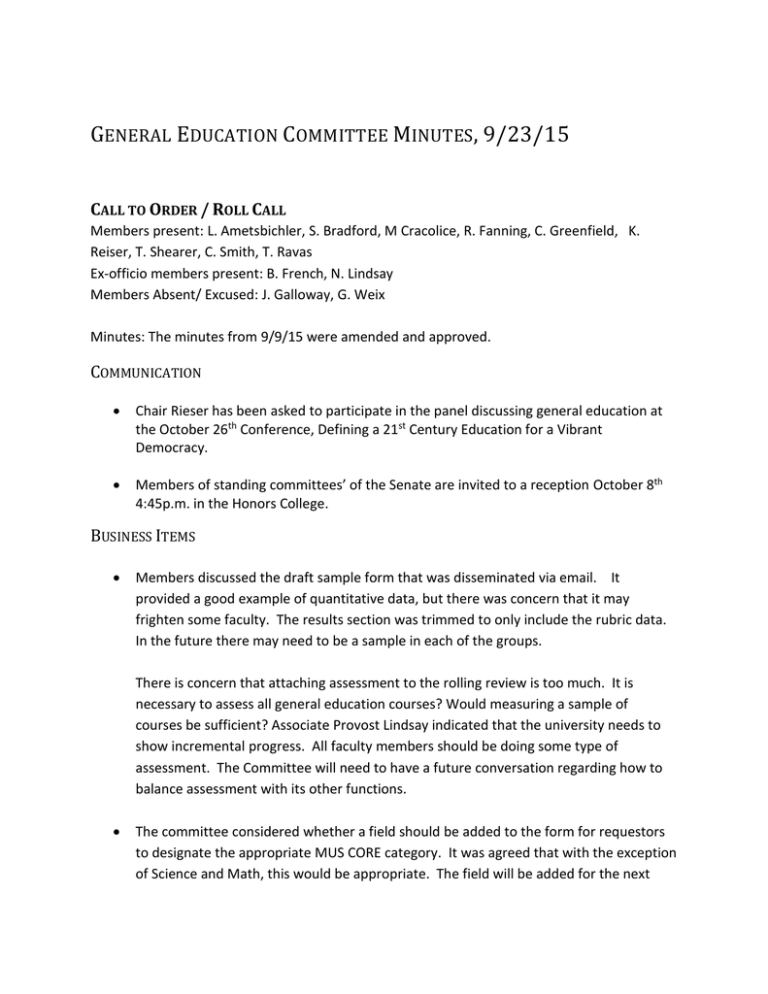
GENERAL EDUCATION COMMITTEE MINUTES, 9/23/15 CALL TO ORDER / ROLL CALL Members present: L. Ametsbichler, S. Bradford, M Cracolice, R. Fanning, C. Greenfield, K. Reiser, T. Shearer, C. Smith, T. Ravas Ex-officio members present: B. French, N. Lindsay Members Absent/ Excused: J. Galloway, G. Weix Minutes: The minutes from 9/9/15 were amended and approved. COMMUNICATION Chair Rieser has been asked to participate in the panel discussing general education at the October 26th Conference, Defining a 21st Century Education for a Vibrant Democracy. Members of standing committees’ of the Senate are invited to a reception October 8th 4:45p.m. in the Honors College. BUSINESS ITEMS Members discussed the draft sample form that was disseminated via email. It provided a good example of quantitative data, but there was concern that it may frighten some faculty. The results section was trimmed to only include the rubric data. In the future there may need to be a sample in each of the groups. There is concern that attaching assessment to the rolling review is too much. It is necessary to assess all general education courses? Would measuring a sample of courses be sufficient? Associate Provost Lindsay indicated that the university needs to show incremental progress. All faculty members should be doing some type of assessment. The Committee will need to have a future conversation regarding how to balance assessment with its other functions. The committee considered whether a field should be added to the form for requestors to designate the appropriate MUS CORE category. It was agreed that with the exception of Science and Math, this would be appropriate. The field will be added for the next review cycle. Camie will contact the instructors of any new courses this year to inquire about the appropriate MUS category. Members confirmed that the meeting length will be extended to 1.5 hours when necessary. Chair Reiser met with the Chair and Chair-elect of the Faculty Senate. The President and Provost have asked the Senate to consider general education reform. They were interested in the Committee’s ideas on what this might look like. Would it be incremental change or a complete over hall? And who should be charged with it. Giving the committees current responsibilities it does not have the time to work on a complete over hall. Chair Reiser hopes that it will at least come up with a proposal to address the issues that have been identified as problematic in the rolling review. The current language for the American and European perspective is problematic. Diversity is missing as is the ability to incorporate interdisciplinary as evidenced by the review of GLI couses. Chair Reiser is on the “Fostering Engaged Citizens through General Education” panel at the symposium and would like to address the questions as a representative of the Committee. The questions are: 1. 2. 3. 4. 5. What can we do in higher education to foster more informed and engaged citizens? What is the role of General Education or a liberal Education in today’s society? What do you see as the strengths and weaknesses of General Education at UM? How would you describe an ideal General Education? What are the processes by which we can facilitate General Education Enhancements? The Committee has identified issues with the current program. The definition of the American and European, Indigenous and Global, Historical and Cultural, and Ethics are problematic. They either are not what was intended or are too broad. The current framework lacks a diversity, discourse, civic and community engagement, technology and information literacy component. It doesn’t integrate well with the Global Leadership Initiative. Interdisciplinary is difficult due to logistics, resources, common course numbering, and the way data is tracked. The program does not comply with the state’s Indian Education for all requirement. It needs to have a logical coherence and be streamlined. Student member Greenfield would like general education to focus on knowledge for application rather than knowledge for knowledge. It should focus on what students need to be successful in the next 10 years. Innovation in general education includes enhanced practices involving integration and interdisciplinary course work that focuses on problem solving with current problems. Could incremental changes be made to gain relevance but still maintain the integrity of UM’s traditional general education? Or is a complete overhaul needed? If so, who would be charged with this? President Engstrom is interested in enhancement. His expectation is that the faculty will lead the effort. Our current program is not that different from 20 years ago. Although there have been many efforts to revise. Implementing significant change is too difficult to navigate politically, so only minimal revisions have been accepted. It is important that there be broad discussion across campus. The General Education Committee does not necessarily want to be responsible for these discussions, but would like to be consulted. A place to start may be with the conference. The expectations of general education can be put into learning outcomes. These can then be compared to the learning outcomes of the existing program. The learning outcomes missing will then need to be addressed. Chair Reiser hopes that the Committee can come up with a proposal to address the problems it has identified during rolling review. Members were encouraged to attend the conference. Members were encouraged to think about chairing the committee next year. Anyone interested should send Chair Reiser an email. The meeting adjourned at 5:20 p.m.
